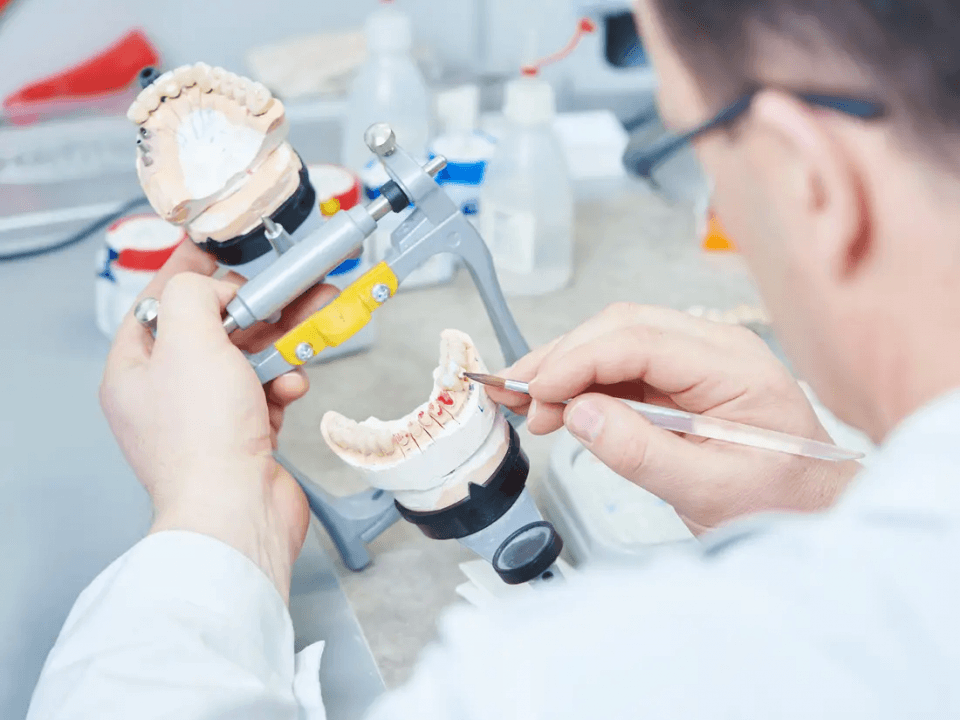
A dental technician, also known as a dental technologist, is in charge of designing, fabricating, and repairing dental equipment.
As a dental technician, you’ll be in charge of aiding with tooth enhancement and tooth restoration. Under the guidance of a dentist, you will construct bridges, crowns, dentures, braces, and other orthodontic equipment.
Working with plastic, porcelain, wax, and metals (including gold and stainless steel) will involve skills such as modelling, sculpting, polishing, wire bending, ceramic work, and casting.
Responsibilities
Throughout your apprenticeship, you may help:
- design, make, modify and repair custom dental devices
- use precision equipment and tools
- shape materials like gold, porcelain and plastic.
Salary
- As a apprentice dental technician, you can expect to earn around £16,000 to £18,000.
- Salaries for qualified dental technicians can range from around £22,000 to £40,000 for those with several years of experience and a specialism.
Working hours
Working hours are typically 9am to 5pm, Monday to Friday, although this can vary depending on where you work. In some instances you may need to do some weekend work.
Working environment
You could work in a laboratory.
You may need to wear protective clothing.
Qualifications
Qualifications you can achieve as an apprentice dental technician include:
- Level 5 Dental Technician – Entry requirements for this level include 4 or 5 GCSEs at grades 9 to 4 (A* to C) and A levels, or equivalent, for a higher or degree apprenticeship. This qualification will take 36 months to complete.
Skills
On a dental technician apprenticeship, you’ll learn:
- the ability to work well with your hands
- knowledge of medicine and dentistry
- to be thorough and pay attention to detail
- knowledge of manufacturing production and processes
- design skills and knowledge
- the ability to analyse quality or performance
- the ability to work well with others
- thinking and reasoning skills
- to be able to use a computer and the main software packages competently.
Employers
The vast majority of dental technicians work for commercial dental laboratories ranging in size from very small to very large. Dentists will write prescriptions for you to work on at these facilities, and you will also repair and alter things. However, you can specialise if you work in a larger laboratory.
You might also work as a specialised technician at a hospital dental department, designing maxillofacial and other dental equipment.
There may be opportunities to work in large private dental clinics that employ their own dental technicians.
Another possibility is to join the military. Through one of the GDC-approved course providers, dentistry technicians may engage in research or instruct undergraduate dental students. You may establish and run your own business if you have sufficient knowledge.
To work in the UK, you must be registered with the GDC, regardless of whether you operate privately, via the NHS, or through another organisation such as the military.
Professional development
Continuous professional development (CPD) is required throughout your career to keep your skills and knowledge up to date and to maintain your registration with the General Dental Council (GDC). You must complete a set amount of CPD hours and keep track of your efforts.
Additional courses in areas such as leadership and management are offered.
Suppose you want to deal directly with patients. In that case, you might continue further clinical training as a clinical dental technician, designing, building, and fitting removable dental appliances for patients with no or few teeth.
There are also opportunities to train as an orthodontic therapist, including aiding dentists with orthodontic treatments such as brace fitting, tooth separators, and bonded retainers.
Career prospects
There are several opportunities for promotion once qualified. Larger commercial laboratories are more likely to have more opportunities. You may need to change jobs to further your career if you work for a small laboratory. After a few years of experience, you may be promoted to management. With enough knowledge, you could even establish your own laboratory.
The NHS has a structured career structure, and you may rise through the ranks as you gain more qualifications, talents, and experience. For example, there are many paths to the senior or chief dental technician rank.
More undergraduate or postgraduate level training is sometimes required to proceed into advanced or specialised dental technology. With further training and qualifications, for example, there are opportunities to specialise in reconstructive sciences like maxillofacial technology, conservation, orthodontics, and prosthodontics.
You might get teaching qualifications if you wish to work as an instructor dental technician.
